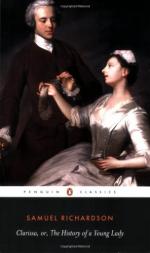Well, then, shall this poor privilege, that we may part with a woman if we will, be deemed a balance for the other inconveniencies? Shall it be thought by us, who are men of family and fortune, an equivalent for giving up equality of degree; and taking for the partner of our bed, and very probably more than the partner in our estates, (to the breach of all family-rule and order,) a low-born, a low-educated creature, who has not brought any thing into the common stock; and can possibly make no returns for the solid benefits she receives, but those libidinous ones, which a man cannot boast of, but to his disgrace, nor think of, but to the shame of both?
Moreover, as the man advances in years, the fury of his libertinism will go off. He will have different aims and pursuits, which will diminish his appetite to ranging, and make such a regular life as the matrimonial and family life, palatable to him, and every day more palatable.
If he has children, and has reason to think them his, and if his lewd courses have left him any estate, he will have cause to regret the restraint his boasted liberty has laid him under, and the valuable privilege it has deprived him of; when he finds that it must descend to some relation, for whom, whether near or distant, he cares not one farthing; and who perhaps (if a man of virtue) has held him in the utmost contempt for his dissolute life.
And were we to suppose his estate in his power to bequeath as he pleases; why should a man resolve, for the gratifying of his foolish humour only, to bastardize his race? Why should he wish to expose his children to the scorn and insults of the rest of the world? Why should he, whether they are sons or daughters, lay them under the necessity of complying with proposals of marriage, either inferior as to fortune, or unequal as to age? Why should he deprive the children he loves, who themselves may be guilty of no fault, of the respect they would wish to have, and to deserve; and of the opportunity of associating themselves with proper, that is to say, with reputable company? and why should he make them think themselves under obligation to every person of character, who will vouchsafe to visit them? What little reason, in a word, would such children have to bless their father’s obstinate defiance of the laws and customs of his country; and for giving them a mother, of whom they could not think with honour; to whose crime it was that they owed their very beings, and whose example it was their duty to shun?
If the education and morals of these children are left to chance, as too generally they are, (for the man who has humanity and a feeling heart, and who is capable of fondness for his offspring, I take it for granted will marry,) the case is still worse; his crime is perpetuated, as I may say, by his children: and the sea, the army, perhaps the highway, for the boys; the common for the girls; too often point out the way to a worse catastrophe.




